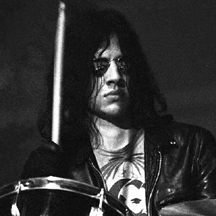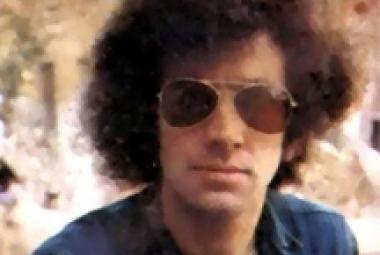SCOTT ASHETON
Scott Asheton (August 16, 1949 – March 15, 2014) was an American musician, best known as the drummer for the rock band the Stooges. He co-formed the Stooges in 1967 along with his older brother Ron Asheton, Iggy Pop, and Dave Alexander. The primitive sound that Asheton made was a template for many punk bands to come. The original incarnation of the band released two LPs on Elektra Records before moving through several lineup changes, releasing a third LP on Columbia Records in 1973 and disbanding the following year. Other than Iggy Pop, Asheton was the only consistent member of the Stooges after the death of his brother, guitarist Ron Asheton, in 2009. (More from Wikipedia)
Dark Carnival was sort of a Detroit punk supergroup that was assembled by Detroit music promoter Colonel Galaxy, whose name was a nod to Elvis Presley’s longtime manager, Colonel Tom Parker. Bootsey X was the first bandmember to be recruited; others included his bandmate in the Ramrods, Mark Norton, plus (as listed in Wikipedia): “Gary Adams from the Cubes [who was also a sometime bandmember in the Lovemasters], Mike McFeaters from What Jane Shared, Jerry Vile from the Boners, Sarana VerLin from Natasha, Greasy Carlisi from Motor City Bad Boys, Robert Gordon and Art Lyzak from the Mutants, Joe Hayden from Bugs Bedow, Pete Bankert from Weapons, [and] Larry Steel from the Cult Heroes.
“Later, Dark Carnival saw some turnover, with the ‘big’ names signing on: Niagara from Destroy All Monsters, Ron [Asheton] and Scott Asheton from the Stooges, Cheetah Chrome from the Dead Boys, Jim Carroll even came in from New York.”
(March 2016)
* * *
The Stooges (also known as Iggy and the Stooges) are the prototype of proto-punk. Like MC5, they are a Detroit band, or more properly an Ann Arbor band. As Stephen Thomas Erlewine observes in his Allmusic article: “Taking their cue from the over-amplified pounding of British blues, the primal raunch of American garage rock, and the psychedelic rock (as well as the audience-baiting) of the Doors, the Stooges were raw, immediate, and vulgar. Iggy Pop became notorious for performing smeared in blood or peanut butter and diving into the audience. Ron [Asheton] and Scott Asheton formed a ridiculously primitive rhythm section, pounding out chords with no finesse – in essence, the Stooges were the first rock & roll band completely stripped of the swinging beat that epitomized R&B and early rock & roll.”
After seeing a concert by the Doors, Iggy Pop (using the moniker Iggy Stooge) formed the Stooges in 1967 with Ron Asheton (guitar), Scott Asheton (drums), and Dave Alexander (bass). As an opening act for MC5, the Stooges lucked into a major label contract when the Elektra Records talent scout signed both acts.
Writing for Allmusic, Mark Deming says of their debut album, The Stooges: “[The Stooges] didn’t really sound like anyone else around when their first album hit the streets in 1969. It’s hard to say if Ron Asheton, Scott Asheton, Dave Alexander, and the man then known as Iggy Stooge were capable of making anything more sophisticated than this; but if they were, they weren’t letting on, and the best moments of this record document the blithering inarticulate fury of the post-adolescent id. Ron Asheton’s guitar runs (fortified with bracing use of fuzztone and wah-wah) are so brutal and concise they achieve a naïve genius, while Scott Asheton’s proto-Bo Diddley drums and Dave Alexander’s solid bass stomp these tunes into submission with a force that inspires awe. And Iggy’s vividly blank vocals fill the ‘so what?’ shrug of a thousand teenagers with a wealth of palpable arrogance and wondrous confusion.”
* * *
Continuing in the Allmusic article, Stephen Thomas Erlewine talks about the genesis of the Stooges’ third album: “Early in 1972, [Iggy] Pop happened to run into David Bowie, then at the height of his Ziggy Stardust popularity and an avowed Stooges fan. Bowie made it his mission to resuscitate Iggy & the Stooges, as the band was then billed. Iggy and [James] Williamson were signed to a management deal with MainMan, the firm guiding Bowie’s career, and the new edition of the band scored a deal with Columbia Records. Temporarily based in London and unable to find a suitable rhythm section in the U.K., Iggy and Williamson invited the Asheton brothers to join the new group, with Scott [Asheton] on drums and Ron [Asheton] moved to bass. Iggy produced the third Stooges album, Raw Power, and Bowie handled the mix. Released in 1973 to surprisingly strong reviews, Raw Power had a weird, thin sound due to various technical problems . . . [with] many Stooges purists blam[ing] Bowie for the brittle mix.”
(December 2016)
* * *
Iggy Pop began working with the Stooges again on his 2003 album, Skull Ring that also featured several younger artists: Green Day, the Trolls, Sum 41, and Peaches. The Stooges toured extensively between 2003 and 2008 with founding members Iggy Pop (vocals), Ron Asheton (guitar), and Scott Asheton (drums), along with (at Ron Asheton’s suggestion) new bandmember Mike Watt (bass guitar), formerly of Minutemen and fIREHOSE, and guest musician Steve Mackay (saxophone), who had performed on the Fun House album. During these tours, the Stooges released an album of all new material, The Weirdness (2007). Also, Elektra Records reissued the band’s first two albums, The Stooges and Fun House in deluxe 2-CD packages in 2005.
* * *
Against the odds, Iggy Pop turns 70 next month, and his music is as vital as ever. His most recent album, Post Pop Depression (2016), ranks 4 stars from Allmusic; Mark Deming writes: “When it was announced that Iggy Pop would be collaborating with Josh Homme of Queens of the Stone Age, the music press buzzed with anticipation about the project. What would the proto-punk icon and the snarky hard rock smart guy come up with? The surprise answer is 2016’s Post Pop Depression, in many respects an unwitting but loving tribute to Pop’s friend and collaborator David Bowie. Post Pop Depression arrived two months after Bowie’s death, and was completed before his health problems became common knowledge. More than anything, though, this music evokes the sound and feel of Pop’s first two solo albums. 1977’s The Idiot and Lust for Life were cut with Bowie in Germany as Pop struggled to make sense of his life and career after the Stooges collapsed. With the reunited Stooges gone following the deaths of Ron [Asheton] and Scott Asheton, Post Pop Depression finds Pop returning to the work he made in 1977, in ways that count the most. Post Pop Depression is smart and thoughtful, intelligent without being pretentious, and full of bold but introspective thinking.”
(March 2017)
* * *
As I might have mentioned already, like Kill City the album that became Raw Power started off as a collaboration between Iggy Pop and James Williamson also. Iggy Pop had been signed with MainMan Management, the company that handled David Bowie. They were recording in England, and after many auditions for a rhythm section, James Williamson suggested that the Asheton brothers be flown over from the U.S.; Scott Asheton sat in on drums, while the Stooges’ founding guitarist Ron Asheton reluctantly agreed to become the bass guitarist. Only at that point did it truly start to become a Stooges album.
(December 2017)















